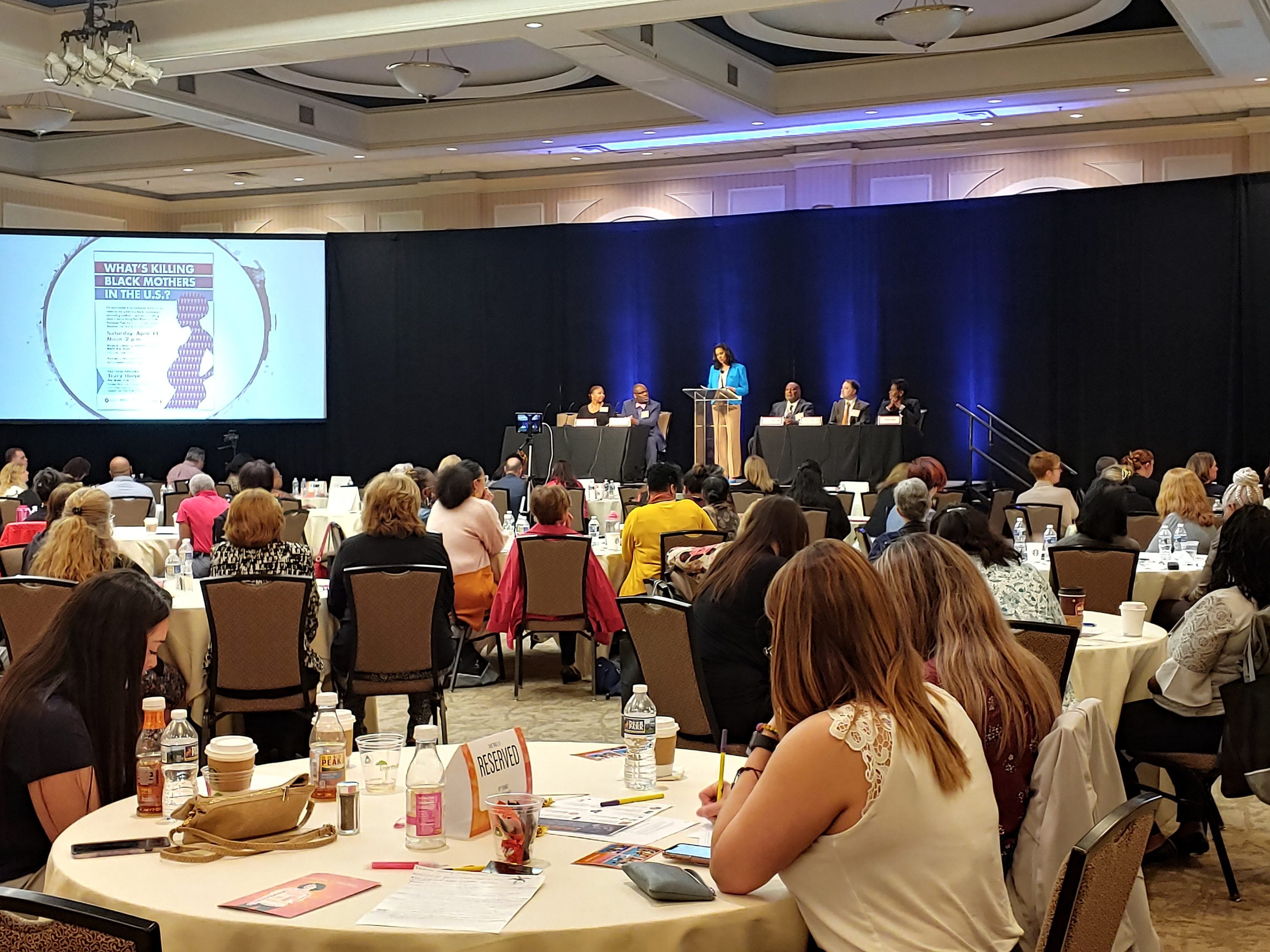Can Delaware close the gap on black infant and maternal mortality?
Across the nation, too, black mothers are three to four times more likely than white mothers to die from pregnancy-related complications.
Listen 2:12
Dr. Kara Odom Walker moderated the 14th annual Delaware Healthy Mother and Infant Consortium summit (Zoë Read/ WHYY)
Tiffany Chalk of Bear, Del., was 22 weeks pregnant with her second child when she checked into the hospital for back pain.
Chalk, then 32, waited six hours before she was informed she was two centimeters dilated and in active labor. Her son was born premature and died one month later.
“It was very stressful. It was stressful on our whole family, and our 10-year-old son. Through prayer and God is how my husband and I made it through. You blame your spouse, like, ‘Why did this happen?’ ” she said. “I was depressed, I just went through a ton of emotions, but I still had to care for a 10-year-old child. It was a lot to bear.”
Chalk doesn’t believe she was given appropriate care or information when she went into early labor. More than a decade later, she advocates empowerment for women to ask questions at the doctor’s office, as well as for education for medical providers.
“As consumers, we have to take control of our own health, and our own priorities, and be educated. As providers, they need to have compassion when they talk to us, a little cultural sensitivity,” Chalk said during an interview at Tuesday’s Delaware Healthy Mother and Infant Consortium summit. “Regardless if the survival rate of my child was 5 percent or 50 percent, that’s still my child. To make me feel like my child mattered no matter what — I didn’t get that. And that was the process that led me to the work years later.”
“I was 32, but probably looked like I was 25. I didn’t have my wedding ring on, my husband was at work. [The doctors likely assumed] I was another young black girl here to have another baby and my baby wasn’t important. So that cultural-competency training is super-important.”
Black infants are 2 ½ times more likely than white infants to die in Delaware before their first birthday. And while black women made up just one out of every four women giving birth between 2011 and 2018 in the state, they made up 50 percent of the mothers who died.
Across the nation, black mothers are three to four times more likely than white mothers to die from pregnancy-related complications.
Those disparities were discussed during the consortium’s 14th annual summit. The organization, on whose board Chalk serves, was created out of a task force that provided 20 recommendations to reduce the infant-mortality rate in Delaware.

Tuesday’s summit was an opportunity for health leaders to have an honest dialogue about the issue, and how to address it. Local and national speakers discussed the social determinants of health — such as income and education inequality.
“It’s things like: Do people have stable housing? Do they have a job? Are they getting a good education? Are they exposed to trauma? Are they exposed to racism? Data show us racism plays a part in whether or not you’re going to have the same outcomes,” said physician Karyl Rattay, who directs the state’s Division of Public Health.
Keynote speaker Arthur R. James, a retired OB-GYN and pediatrician, said that while the health-care system in the United States puts low-income and minority populations at a disadvantage when it comes to quality of care,, the majority of contributors to health disparities such as infant and maternal mortality are nonclinical.
He said the disparities stem from America’s long history of racism.
“The root cause of the disparities we see not just in birth outcomes, but in any category you measure, lies within the methods of which our country has managed race, where we have historically provided substantial advantage to people who are white and simultaneously significant disadvantage to people who are not white,” James said.
“2019 is the 400-year anniversary of slavery, and throughout that 400 years black people spent 246 years in slavery, another 99 years under Jim Crow, and those two periods of time together to this day account for 86 percent of the African-American experience,” James said. “When we compare blacks and whites in any category, we never mention that history, we always make the comparison as if black and white people started out on a level playing field, and the fact is it has never been level. Even after the passage of the Civil Rights Act. We’re hoping with this 400-year anniversary America will wake up and begin the process of changing the patterns we’ve established that are racially based and unfair.”
Rattay said it’s critical that women are healthy prior to becoming pregnant. Until the state and country work to ensure that minority women are supported before becoming pregnant, she said, the gap will not be closed.
“Focusing efforts on ensuring we are reaching women, and especially women of color, pre-conception to prevent or manage chronic conditions and, very importantly, between pregnancy,” she said. “After a woman has had their baby, it’s important their needs are met at that time too, and that includes making sure we’re asking them the very important question of, ‘Do you want to get pregnant in the next year of life?’ ”
WHYY is your source for fact-based, in-depth journalism and information. As a nonprofit organization, we rely on financial support from readers like you. Please give today.





